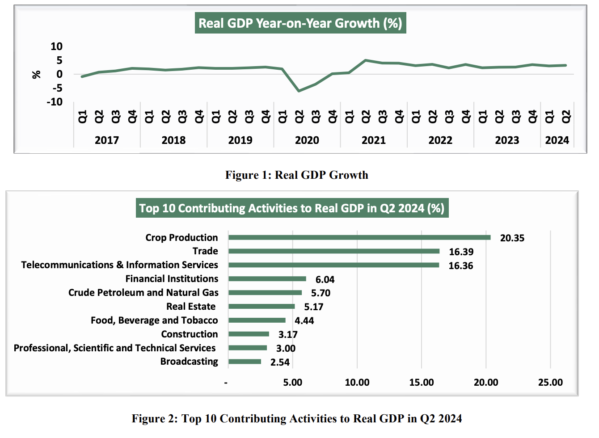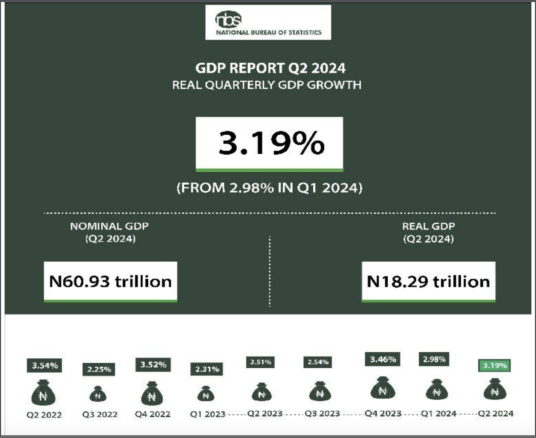Nigeria’s Economy Grows by 3.19% in Q2 2024: Services and Industry Lead the Charge – Nigeria’s Gross Domestic Product (GDP) grew by 3.19% year-on-year in the second quarter of 2024, marking a significant improvement over the 2.51% growth recorded in the same period last year, according to the latest report released by the National Bureau of Statistics (NBS). This growth, driven primarily by the Services and Industry sectors, also surpassed the 2.98% growth achieved in the first quarter of this year.
The Services sector, which continues to be the backbone of Nigeria’s economy, led the way with a robust growth of 3.79%, contributing a substantial 58.76% to the nation’s GDP. Within this sector, Financial and Insurance Services, Telecommunications, and Trade were key drivers, highlighting the resilience of Nigeria’s service-based economy.
The Industry sector also demonstrated a notable recovery, growing by 3.53% in Q2 2024. This was a sharp contrast to the -1.94% contraction experienced in the same quarter of the previous year. The Manufacturing sub-sector, although modest, showed signs of stability with a 1.28% growth, supported by Food, Beverages, and Tobacco production.

Nigeria’s oil sector, long seen as a critical component of the economy, showed remarkable resilience. The sector posted a year-on-year growth of 10.15% in Q2 2024, a significant rebound from the -13.43% decline recorded in the second quarter of 2023. Despite this recovery, the oil sector’s contribution to the overall GDP remained relatively small at 5.70%, reflecting the ongoing diversification of the Nigerian economy.
On the other hand, the Non-Oil sector, which remains the dominant force in the economy, grew by 2.80% in real terms. This sector, comprising Agriculture, Manufacturing, Trade, and other key services, accounted for 94.30% of the nation’s GDP in the second quarter.
The Agriculture sector, a vital part of Nigeria’s economic fabric, grew by 1.41% year-on-year in Q2 2024. Crop Production, which represents the largest sub-sector within Agriculture, remained a steady contributor to the economy. However, this growth was slightly lower than the 1.50% recorded in Q2 2023, indicating challenges such as unfavorable weather conditions and supply chain disruptions.
In nominal terms, Nigeria’s GDP stood at ₦60.93 trillion in Q2 2024, representing a 16.94% increase from ₦52.10 trillion in the same quarter of the previous year. This nominal growth underscores the impact of inflation and other economic factors on the overall value of goods and services produced within the country.
Despite the overall positive growth, certain sectors faced significant challenges. The Construction sector, for example, grew by just 1.05% in real terms, with a notable quarter-on-quarter decline of -21.08%. Similarly, the Manufacturing sector’s growth, while positive, showed signs of deceleration compared to previous quarters.

The report also highlighted the ongoing difficulties in the Utilities sector, where Electricity, Gas, Steam, and Air Conditioning Supply recorded a year-on-year real growth of 5.96%, down from the 6.10% recorded in Q2 2023. The Water Supply, Sewerage, Waste Management, and Remediation sector faced an even steeper decline, with real growth dropping by 12.36% compared to the previous year.
Overall, Nigeria’s Q2 2024 GDP report reflects a cautiously optimistic economic outlook, with strong performances in the Services and Industry sectors balancing out challenges in Agriculture and Utilities. The sustained growth in non-oil sectors highlights the country’s progress in diversifying its economy away from oil dependency.
As Nigeria looks ahead to the rest of 2024, economic policymakers will need to address the underlying issues in sectors that are lagging behind while continuing to build on the strengths of the service-driven economy. With global economic uncertainties and domestic challenges still in play, the road ahead will require careful navigation to sustain and build upon these growth figures.






























